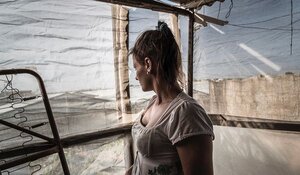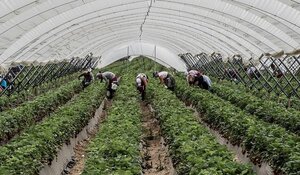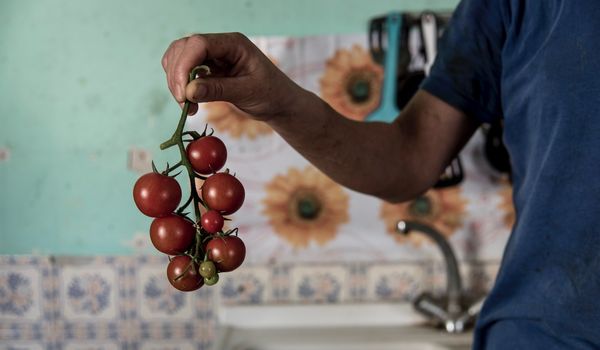Women working without protective gear in Spanish strawberry fields, Moroccan seasonal laborers trapped without water or electricity in crowded shelters, undocumented workers living in camps without access to washing facilities or health care - the Corona pandemic has worsened the working conditions of thousands of agricultural workers all over Europe.
Widespread border closures in an attempt to contain the virus cut off the constant stream of seasonal workers, European vegetable and fruit production so heavily relies on. With borders locked down, farmers and authorities scrambled to find labor. During the state of emergency in March, the Spanish government declared agricultural workers “essential”, in April Germany and England flew in Romanian workers on charter flights to harvest asparagus and other vegetables.
But although Corona revealed the dependence of most European food production on seasonal and migrant workers, their working conditions - already dire before - only worsened. Women, who make up large shares of the workforce, are particularly affected.
Not a labour shortage, but a shortage of rights for workers
In the Italian region of Apulia, Basilicata and Calabria, in the so-called area of “Arco Ionico”, where there are around 42,600 companies in the agri-food sector, 22,702 women used to work in the fields. 5,901 were migrants, most of them from Romania and Bulgaria. A survey from the Italian Ministry of Agriculture, CREA (Council for Agricultural Research and Economics) and the NGO Action Aid, revealed that during the lockdown, women foreign laborers were even more in a condition of weakness, vulnerability and precariousness, also due to family and social difficulties, and that they were exposed to blackmail of a job application on the verge of fairness and lawfulness. They became victims of forced labor and labor exploitation.
Italy was the first EU member state to declare a state of emergency closing its borders on 31 January 2020. National farmers’ organizations such as Coldiretti declared that these measures caused a labor shortage because Eastern European workers (mainly Romanians, Poles and Bulgarians) were not allowed to travel to the country. Farmers unions have estimated a shortfall of about 370,000 seasonal workers.
According to Alessandra Corrado, Associate Professor at the Department of Political and Social Sciences at the University of Calabria and Letizia Palumbo, research fellow at the Migration Policy Centre at the European University Institute in Florence, the pandemic “highlighted the dependence of the agri-food sector on cheap and flexible migrant labour, one of the results of power imbalances in long supply chains. However, in many areas this labour shortage was largely fictitious”. Instead, Corrado and Palumbo write: “There is not a labour shortage, but a shortage of rights for workers”. As reported by the two scholars: “In some areas, the labour shortage of Eastern European workers has therefore been offset by a reserve army of irregular migrant labour. In fact, a lack of labour inspectorate controls in the fields during the pandemic has contributed to an increase in recourse to irregular workers”.
In fact, for these regions and according to the survey by CREA, part of the Romanian workers went back to their country and they are unlikely to return in the short term. The reason is that Italy is considered a high COVID-19 risk area. Therefore, a return would entail a quarantine period, with all the problems related to domiciliation and the inability to work.
The situation is different in Vittoria, Sicily, one of the main areas for cherry tomato production in Italy. Up to 5,000 Romanian women still work there as tomato pickers. “Here there was not a labor shortage and workers continued to go to work in the greenhouses. Most of the migrant workers from Romania and Tunisia live here throughout the year”, Giuseppe Scifo, Secretary of CGIL, Italy's largest union, said. Problems that were reported years ago, remain in place. Tomato pickers live in storehouses and shacks in the middle of the fields. Even if women work twelve hours a day, they earn as little as 25 to 30 euros. They are paid less than their male counterparts for the same tasks working in the same fields. Additionally, they face discrimination and sexual harassment.
Change through public shaming

Likewise in past years there have been repeated media reports about exploitation and sexualised violence on the berry plantations around Huelva, Spain. The region is the largest producer of strawberries in Europe. In the 2018/2019 season more than 340,000 tons of strawberries were produced there. The companies thus made a turnover of 554 million euros. Despite this, the minimum wage per day for strawberry pickers in Huelva is around 42 euros, which is lower than the cross-sector minimum wage in Spain.
This is what Ana Pinto Lepe, a former worker in the red fruit industry in Huelva, said. Together with other workers, she co-founded the collective “Jornaleras de Huelva en Lucha”, to fight sexual harassment in the fields, as well as labor exploitation. The situation has been exacerbated by the Corona crisis, she said in May. As only around 7,000 Moroccan workers of around 24,000 hired in origin could enter Spain before the borders were closed, the pressure to work on the others increased, said Lepe. For them, a working day was "like two days in one" and for overtime they would only receive the normal hourly wage.
"There is more abuse, there is more exploitation in the workplace and it will only get worse and worse over time as a result of the coronavirus pandemic," Pinto Lepe said. The production in Huelva relies heavily on women from Morocco, who come to Spain for the harvest season under a quota system. They are selected in Morocco by ANAPEC, an agency set up specifically for this purpose. Most of them cannot read or write, do not speak Spanish and depend on the income to feed their families in Morocco. This makes them particularly vulnerable. At the height of the lockdown they were trapped in farms far from the next village. At the end of the season - but unable to return home due to closed borders - some employers left them without water or electricity, as Pinto Lepe explained and local media reported.
Several members of Pinto Lepe’s collective spoke about the situation, but only anonymously, for fear of reprisals. One of them said she worked for Cuna de Platero, one of the biggest companies in Andalusia. Members of the collective said: "We denounced the lack of respect for protective measures at the beginning of the corona, but of course there were already a lot of problems before and it continued”. Suspecting the presence of infected people in the company, many people go to work with fear in their stomachs", she said. Indeed, there had been many Corona outbreaks in the fields, such as in Huesca where more than a dozen workers employed by a company called “Frutas La Espesa” were infected with COVID-19.
Urgent call on governments to act

As attempts to inform the labour inspectorate of such problems have not proved helpful, the collective “Jornaleras de Huelva en Lucha” has shifted their activity to publicly shame companies - especially on social media. "After we went public, some companies, but not all, have introduced security measures," said Pinto Lepe. In one company for example she said a day of rest was installed. Previously, the employees had worked there every day of the week.
But the efforts of the collectives have finally sounded an alarm in Madrid as well, it seems. In May, Yolanda Diaz, the Spanish Minister of Labour, announced measures by the supervisory authorities for labour, social security and the police. In the months that followed, stricter controls were put in place on, among other things, "cases of labour exploitation and trafficking in human beings for forced labour, slavery [...]" and against fierce opponence of farmers and their unions.
Support also came from the UN at the end of June, as the Special Rapporteur on Extreme Poverty and Human Rights, Olivier De Schutter, urged the Spanish government to act. “The complete dependence on seasonal migrant workers in the strawberry business of Huelva routinely leads to situations that amount to forced labour, in complete disregard both of international human rights standards and of domestic legislation,” De Schutter said (7 September 2020).

